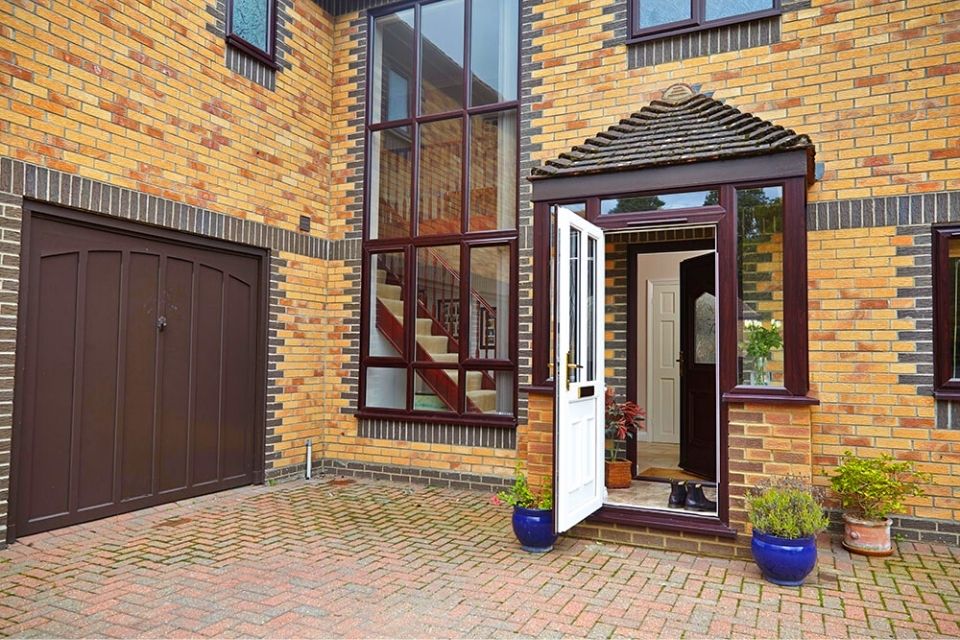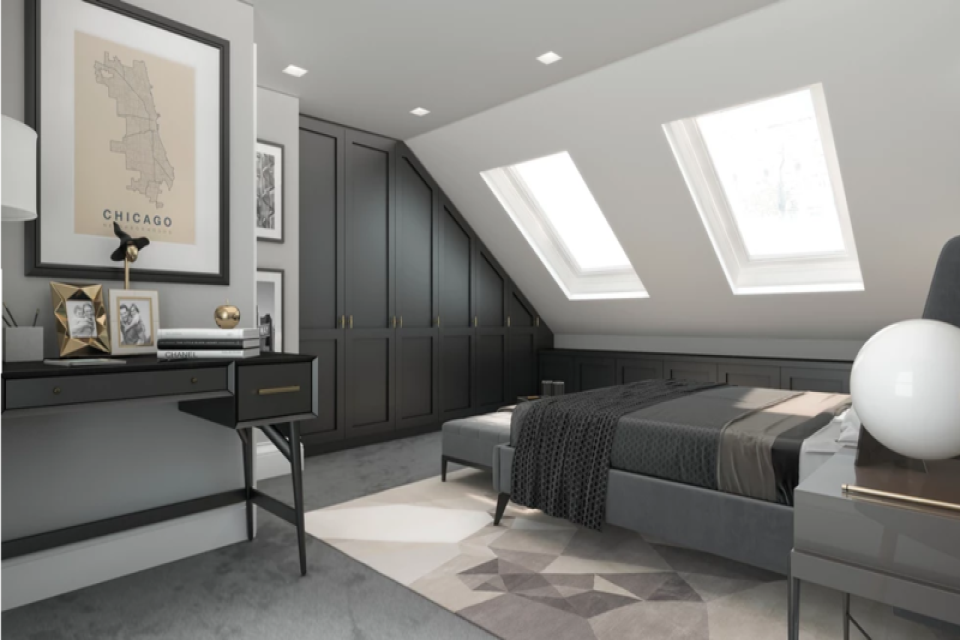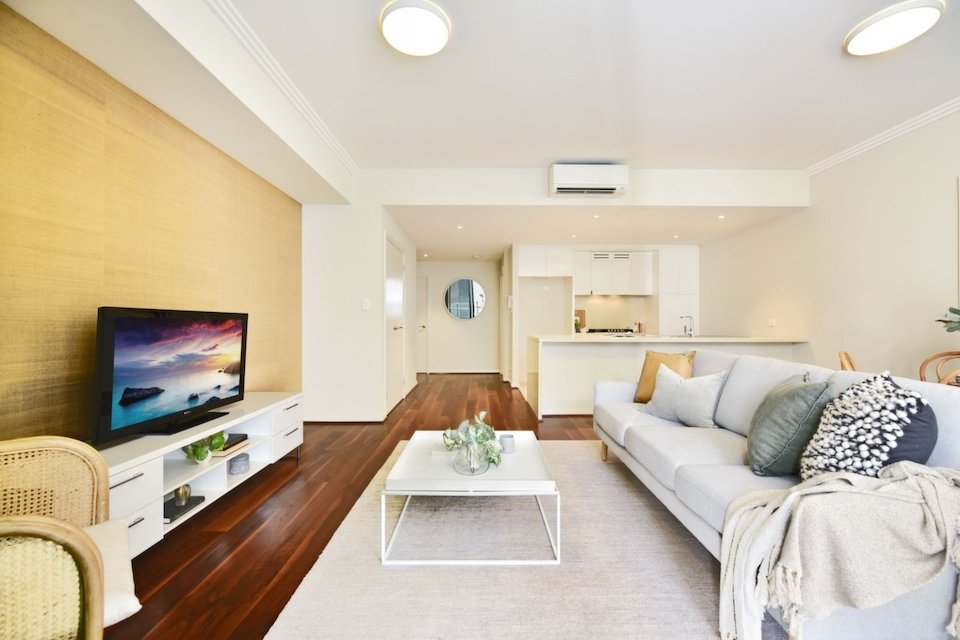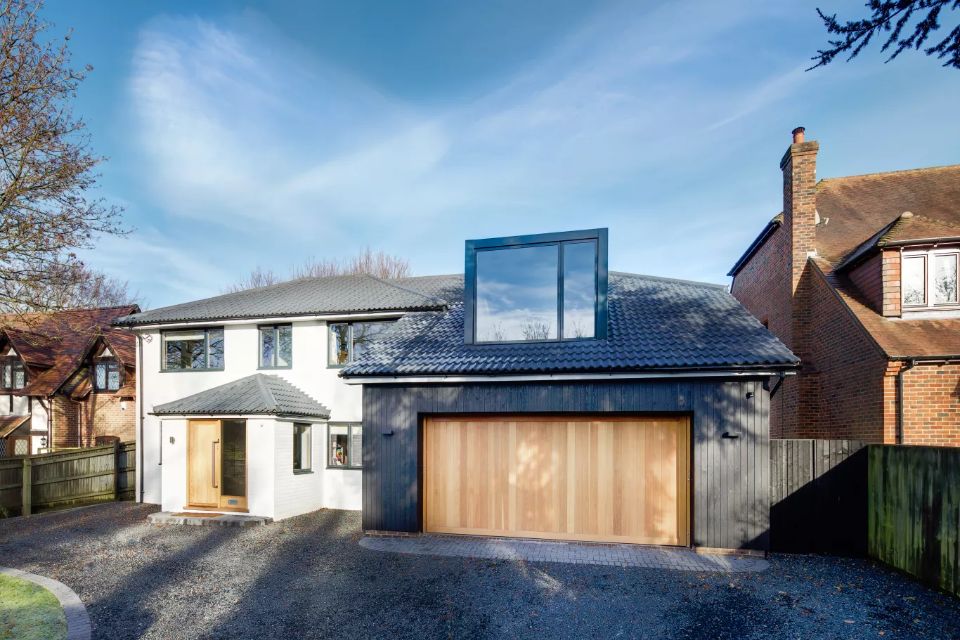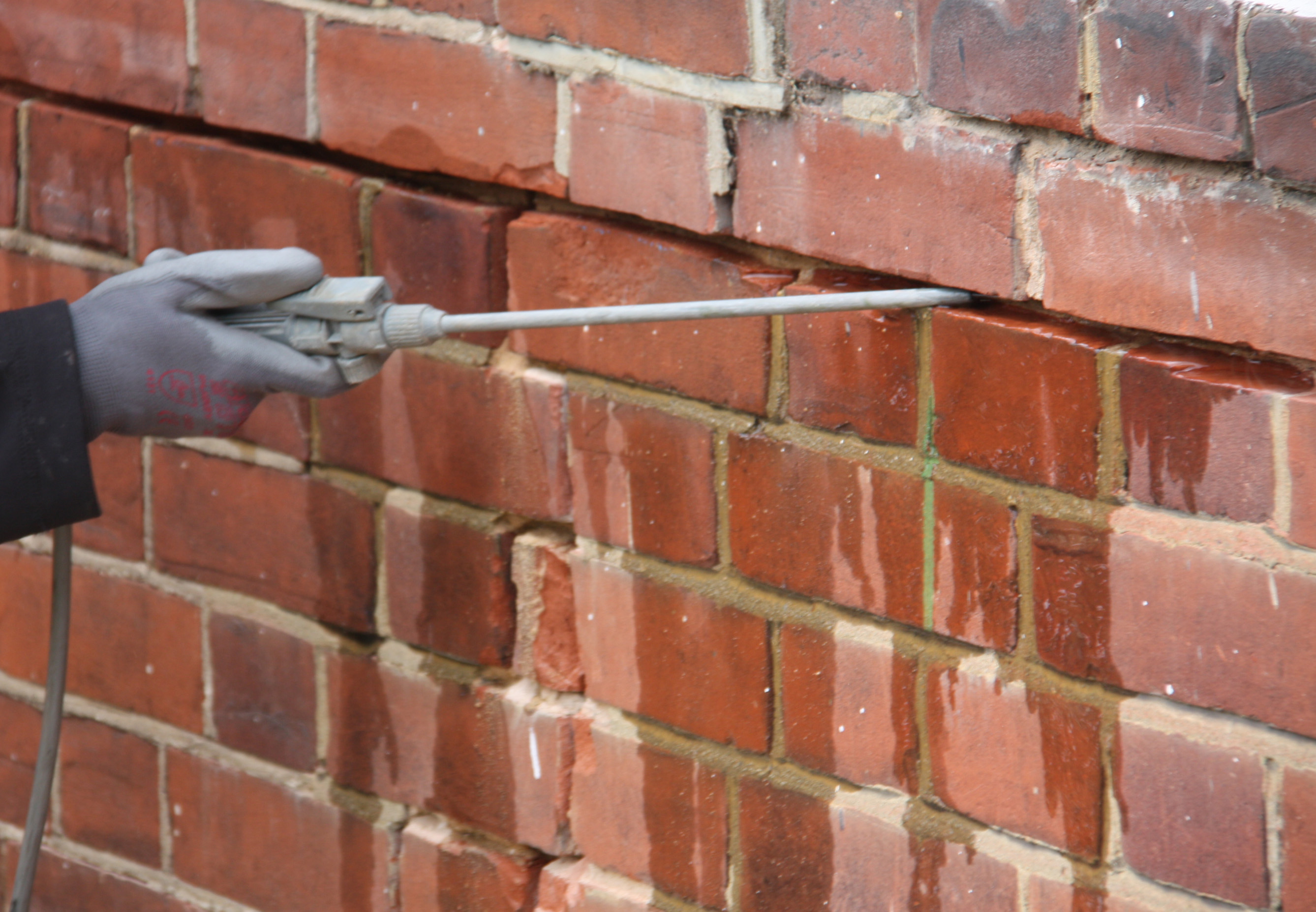How Much is a Porch in 2025?
The average cost to have a new porch installed is between £3,000 and £4,000. Once work begins, it typically only takes between one and two weeks to complete.
Why is a new porch a good idea?
Investing in the cost of a new porch will provide a brilliant addition to your home. It offers you more security, creates extra space, adds a new look to your home from the outside and can potentially increase the value of your property.
Having a porch built is a great way to gain extra space, and somewhere to hang up your coats and store your shoes. An enclosed porch, in particular, provides more security and additional storage options, making it akin to a small room where you can keep items dry and safe. And not only that, it will enhance the curb appeal of your home.
What are porches mostly used for?
It's an area most commonly used to store outdoor items such as shoe racks and somewhere to hang coats, keeping them neat and tidy away from the back of a chair or left at the bottom of a staircase.
Porches can also be beneficial due to allowing in natural light to the home.
Is it a good idea to build a porch DIY?
While a porch is a very worthwhile investment for your home, it can be very time-consuming, so it’s best to enlist the services of professionals instead of attempting the job yourself.
The best thing about hiring a professional is that they can sit down and explore all of the options with you, offering design suggestions and providing very close estimates on costs and timescales.
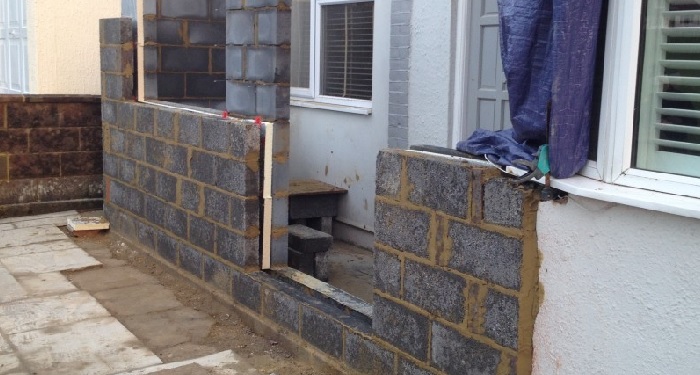
Of course, you’ll want your porch to be built with the same décor as the rest of your home, so that it naturally blends in with the current style and doesn’t stand out like an imposter.
There are a multitude of porch designs that you can choose from, all to match your style preferences and budget.
Listen to any advice given by a professional.
A building professional will advise you on how you can achieve that and what materials, colours and styles will blend in perfectly with your home.
There are many cost-affecting factors to consider, which we will delve deeper into to help you understand exactly what sort of budget you’ll need to have this work done.
Porch Prices
To help you out with the average costs of a new porch installation (including labour costs), we’ve provided the below table.
However, the final price will depend on the size and design of your porch, any additional work needed to accommodate the design, as well other factors such as whereabouts in the UK you live.
| Porch Type | Average Cost |
|---|---|
| uPVC Lean-to Porch | £3,000-£3,500 |
| uPVC Roof Gable porch | £1,900-£2,500 |
| Brick porch | £2,200-£3,500 |
| uPVC Edwardian porch | £2,500-£3,000 |
| Flat gable roof porch | £3,000-£4,000 |
| Aluminium porch | £2,300-£2,900 |
While the duration it takes to build a porch will also depend on the same factors as those affecting the price, the majority of porch installations are likely to take 1 or 2 weeks. The one exception being an aluminium porch, which can potentially be fitted in a matter of days.
- How Much is a Porch in 2025?
- Supply Cost to Build a Porch
- Additional Costs When Building a Porch
- Labour Cost to Build a Porch
- Choosing a Porch Style
- How Long Does It Take to Build a Porch?
- Benefits of a Porch
- Energy Efficiency Considerations for Porches
- Porch Design Considerations
- How Much Does It Cost to Remove a Porch?
- FAQs
Supply Cost to Build a Porch
As you can see from the above table, there are a few different porch styles. However, when it comes to materials, the main construction tends to be made with uPVC, timber or brickwork.
The average porch is usually around three square metres, so if you are purchasing materials yourself then this is a good starting point to help calculate any supply costs you may require.
The majority of people will leave purchasing of materials to the company fitting their porch, although understanding costs prices is still an advantage when it comes deciding which quote is most suited to your budget.
| Porch Type | Material Cost Range |
|---|---|
| uPVC Porch | £300 – £600 per m² |
| Timber Porch | £500 – £900 per m² |
| Brick Porch | £1,500 – £2,000 total |
uPVC Porch
Unplasticized Polyvinyl Chloride, or uPVC as it’s more commonly known, is a cost-effective and durable substitute for painted timber. It has a ton of benefits from its low maintenance to its cost, and it’s becoming a very popular option for homes across the UK.
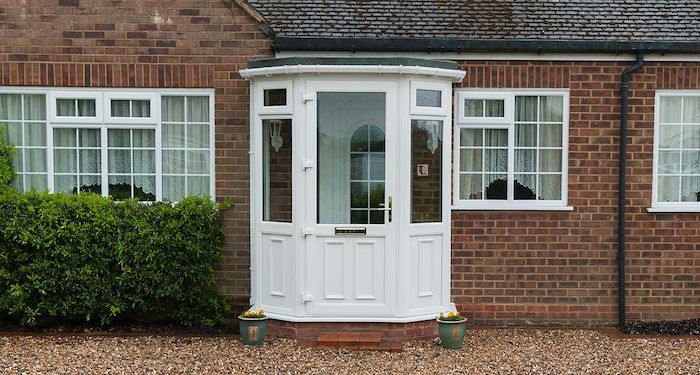
Now, for the porch structure, uPVC will cost you around £300-£600 per square metre for materials, which is very reasonable for a new porch. Of course, these prices will differ depending on the quality of materials you choose and where you purchase them from.
As we mentioned earlier, it can pay off to check a few different stores first before purchasing the materials.
Pros
- Cost-effective, affordable and widely available
- Durable and weather-resistant
- Lightweight and easy to install
Cons
- Low-quality materials can make porch look cheap
- Doesn't always align with aesthetics of the property
- Limited designs and customization
Timber Porch
Timber can be used in a few different styles, but with the rise in uPVC, its most commonly found in flat gable roof porches. These are charming little porches with a pointed roof, despite the ‘flat’ name.
The materials for this are a little more expensive at between £500-£900, depending on the wood you choose.
As we have mentioned, the popularity of uPVC has seen a reduction in timber porches, but they are wonderful additions if you are comfortable with the price.
Pros
- Traditional and aesthetically welcoming
- Potential to paint or stain in desired colour
- Strong, durable and long-lasting structure
- Well-suited to a range of properties
Cons
- Material costs are more expensive
- Requires maintenance (painting, resealing)
- Easily affected by rot and weather damage if not treated
Brick Porch
Brick porches are more expensive again, but they look like more permanent parts of your home, which can be the selling point for many. The materials for a brick porch cost anywhere from £1,500 to £2,000, which is much higher than both uPVC and timber.
However, a fitter will be able to give you a very accurate quotation when they can view your property by working out the number of bricks you need to complete the job, along with options for windows, doors and floors.
Pros
- Strong, durable, and long-lasting material
- More in keeping with rest of property
- Easy to customize and add additional features
- Potential to add value to your home
Cons
- Most expensive of the three options
- Longer build time with less flexibility
- Structure may require foundation work
Additional Costs When Building a Porch
There are certain additional costs or jobs that are commonly associated with new porch installations. While they may not be mandatory in any way, they are still worth considering if you have the budget available.
For instance, planning for a new porch extension can involve potential additional expenses such as electrical work and construction duration based on size and materials.
Planning Permission
If you find you need planning permission, householder applications for extensions range from £150-£200, which is payable upon submitting your planning permission to your local authority.
In general, for a new porch installation you don't usually require permission, however, there are some caveats to this rule so it is always best to check with your local council or a structural engineer before starting any work.
Providing your home isn’t a listed building, planning permission isn't needed unless the total floor area exceeds 3 square metres, the height of the porch exceeds 3 square metres or if the porch is within 2m of a public footpath, road or boundary.
Foundation and Groundwork
In terms of a new uPVC porch you may require a concrete base before it can be installed, which will cost approximately £50 per m2.
However, a timber or brick porch will require something much more substantial. Especially if you treating your porch as a larger extension, rather than an extended entrance to your property.
If this is the case, then materials and labour fees to install a suitable foundation will be much higher.
New Front Door
While the entrance to a porch is often just the initial step into the property, in some cases they are still considered a new front door. This can certainly be the case if you opt for a brick-built porch, as it's part of a much more secure structure.
Door prices can range anywhere from £115 – £2,000, although for a uPVC or timber porch it's likely the door will already come as standard. Whereas for a bespoke brick design, you may be willing to spend a little more.
Flooring Installation
Although the flooring installation is likely to already be included within the price of a new porch, it's worth considering the cost if you decide to upgrade.
Generally speaking the average porch doesn't require much more than a vinyl or laminate flooring so you only really need to budget between £16 and £45 Cost per m². If you decide to lay a hardwood floor, this will be significantly higher.
Labour Cost to Build a Porch
The cost of labour for your porch installation is a far trickier thing to work out than any additional costs or supplies, and it usually involves getting quotations from different contractors.
Now, your main fitter will guide you through this and possibly even offer to do this for you by sub-contracting to firms or tradespeople that they commonly work with.
The problem is you will need a price from a builder or fitter to erect your porch structure, a window fitter to install the windows and doors, an electrician to install a porch light and possible a plug socket if you want one, and possibly a floorer depending on what type of floor you are opting for.
As this can get quite confusing, we’ve provided a table below to show the average costs of these tradesmen, but first, it’s important to know how these figures can be affected by certain factors.
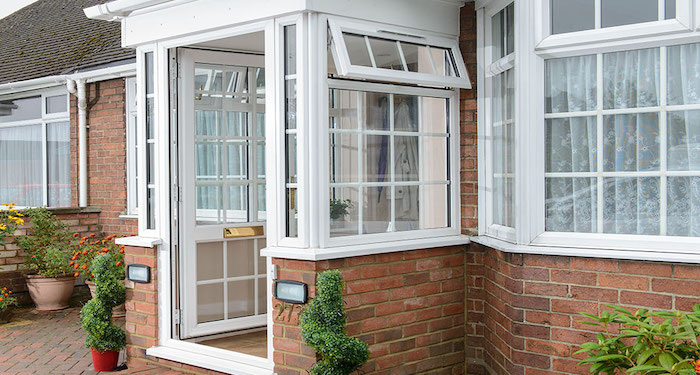
The location of your home is the biggest factor on cost with tradesmen and contractors, and big cities like London and Birmingham naturally attract higher rates for labour due to cost of living in those areas and the dense population.
Contractors in these high-density areas are far more in demand than anywhere else, meaning they can charge higher prices, however, due to the cost of living in these areas, they’re not much better off than any other contractor in a quieter area.
In contrast, tradespeople in small towns and villages have to be very competitive on price in order to win jobs from the smaller customer base, so that’s why the rates are so far apart.
A good rule of thumb is to take the higher rate as a guide if you live in a main city and the lower rate if you live somewhere rural or quiet.
Choosing a Porch Style
Here is a list of popular porch types and their prices:
uPVC Porch Cost
uPVC porches are certainly the most popular options these days, with affordable costs, fairly simple erections and a whole host of practical benefits.
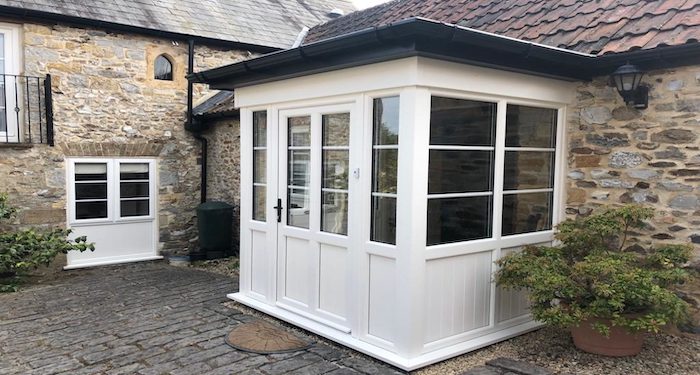
uPVC is incredibly durable to any weather conditions; it requires almost no maintenance, and it’s much cheaper than other options.
You could argue that it lacks much character, as many uPVC porches look very similar, but the practical benefits far outweigh the desire for a unique structure.
Depending on the style, you can expect £1,900-£3,000.
Lean-to Porch Cost
A lean-to porch is very easy to distinguish as it juts out from the home with a single down-sloping roof and a door to the side.
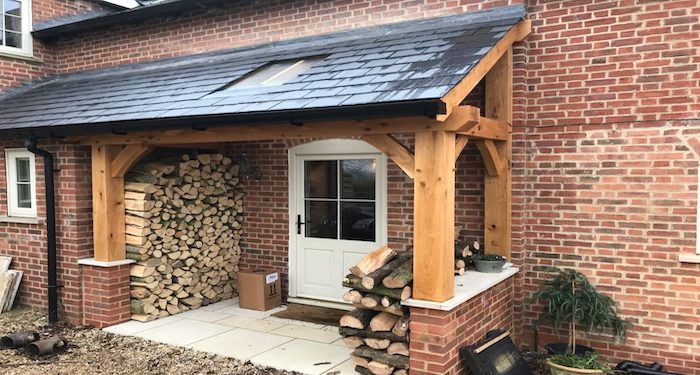
Generally, they’re not very large structures, and they offer another layer of security and a place to leave coats and shoes.
Despite their small size, they are very handy, and many homes have lean-to porches. They can be made from uPVC or timber, so they’re incredibly versatile. Flat roofs are also a suitable and contemporary choice for lean-to porches, especially for homes with large windows or low rooflines.
A lean-to porch will cost about £3,000-£3,500.
Aluminium Porch Cost
Aluminium porches are almost completely glass, with an aluminium frame that makes up a rectangle over your front door.
Again, they aren’t very big spaces, but they offer a little extra storage for umbrellas, coats and shoes.
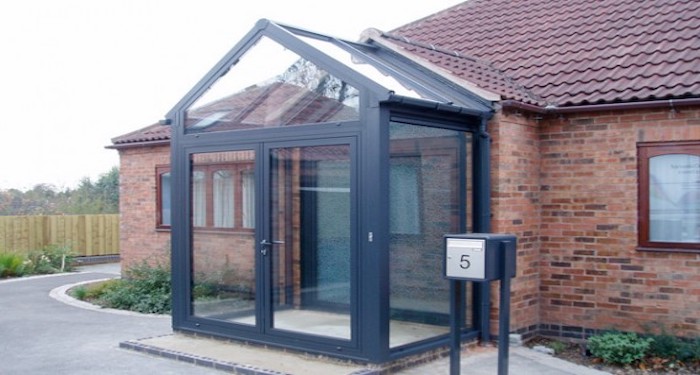
They are quick to erect in just 3-5 days, but they aren’t much cheaper than other porches due to the amount of glass.
They are also nearly impossible to repair if they get damaged, and you will need to replace the porch entirely if this happens.
Aluminium porches cost between £2,300-£2,900.
Edwardian/Victorian Porch Cost
Edwardian and Victorian porches are very similar in which they have pointed roofs and extend to a small square in front of your front door.
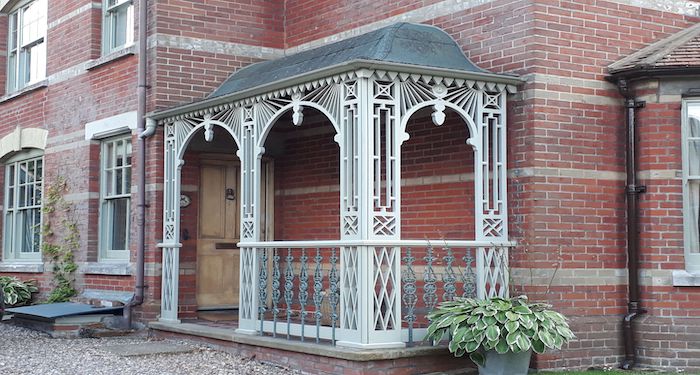
They’re made from timber and are more commonly found in more traditional homes. While they aren’t very popular for new porch erections, they certainly serve a purpose for a more rustic look if you wanted that particular style.
These porches will typically cost £2,500-£3,000.
Brick Porch Cost
Brick porches look like very permanent fixtures to your home, with sturdy front doors and a good amount of space inside.
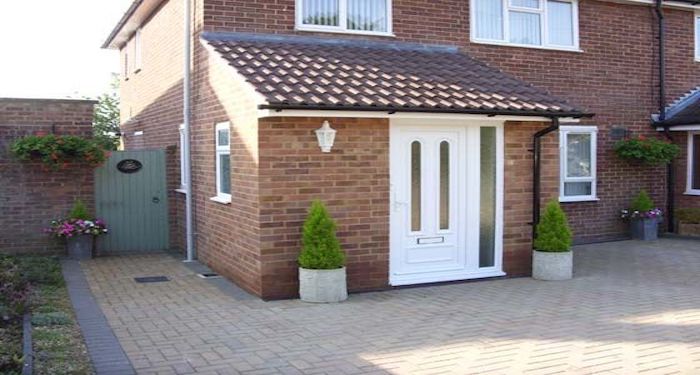
If your home isn’t bricked, it may look peculiar without a rendering added to it, but if your home does have that rustic brickwork, this is the perfect porch solution for you.
A brick porch will cost £2,200-£3,500 overall.
How Long Does It Take to Build a Porch?
The building of a porch extension generally takes between one and two weeks; however, aluminium porches take less than a week. There are a few stages to install a new porch extension, which makes the entire job quite lengthy.
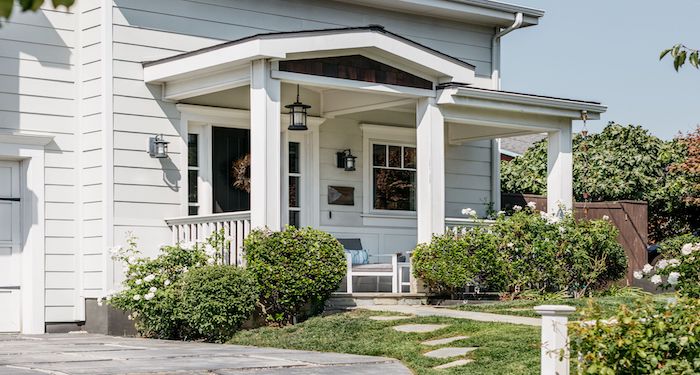
Although it is an exterior addition, this shouldn’t cause you too much trouble and shouldn’t affect your home life during the installation!
To help you get a better understanding of the process of building a porch, we’ve broken it down into a list of seven key steps below with some timeframes associated with them:
- The foundations will be laid first, including all of the necessary excavations and preparation work to ensure that the porch will be structurally sound once erected. This usually takes a day or two.
- A damp-proof membrane is added next to avoid any moisture invading the porch, causing damp issues that are very tough to combat in a porch. This should only take a day to complete.
- The sub-floor is installed next to provide the floor to your porch. Later, the flooring will be added and waterproofed fully, but this is the sub-floor on which the porch will be installed.
- The porch is then erected, lining up with the sub-floor and damp-proof membrane. At this point, any doors and windows will be installed, along with any necessary electrics.
- The roof will come next, as the porch is now fully erected and acts as the support for the roof which again is aligned with the damp-proof membrane and fully waterproofed and sealed.
- Guttering is added around the roof to stop any water sitting atop the roof and causing leaks and damages.
- Finishing touches are then added, which are mostly cosmetic to your requests!
The job can be completed in as quick as one week, providing that everything goes perfectly to plan, but this is rarely the case, and somewhere around ten days is usually a good aiming point.
Benefits of a Porch
Here are a few benefits you can experience:
Aesthetically Pleasing
A porch can add a ton of value to your home, and it simply makes your home look bigger, more unique and more high quality.
It’s such a small, simple addition, but it really does make a world of difference just to the curb appeal.
If you’re looking to sell your home soon, check out house prices of similar sold homes with and without a porch to see if the investment is worth it!
Practical
A porch provides several practical elements to your home, from an increase in natural light to additional storage. Porch extensions, in particular, can significantly enhance the functionality of your home by offering more space and design options.
It may seem like a small benefit, but the ability to keep coats, shoes, umbrellas and all those outdoor items separate in your porch can make a ton of difference with keeping your home neat and tidy.
Plus, the kids don’t have an excuse for running around the house in dirty shoes!
Security
A porch basically doubles the security amount to your home, with not one but two doors protecting you.
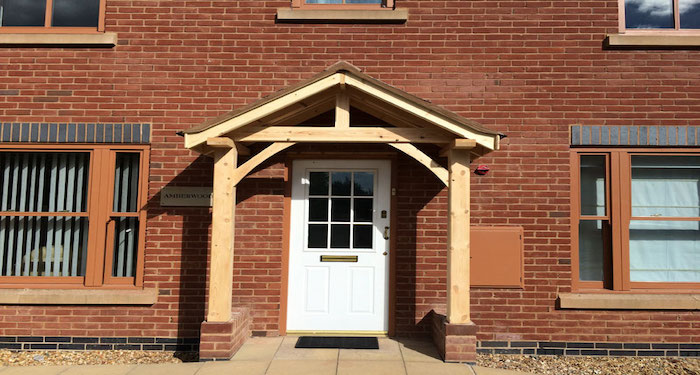
Add to this a simple security light and CCTV system, and your house is too hot to handle. Several case studies demonstrate how much of a deterrent these additions are to burglars, so it’s worth considering.
Energy Efficiency Considerations for Porches
When building a porch, it’s essential to consider energy efficiency to minimize heat loss and reduce energy bills. Here are some key energy efficiency considerations for porches:
- Insulation: Proper insulation is crucial for maintaining a comfortable temperature in your porch. Use materials like foam board insulation or fiberglass batts to insulate the walls and ceiling effectively. This will help prevent heat loss during the winter and keep the space cooler in the summer.
- Glazing: Opt for energy-efficient glazing options such as double-glazed or triple-glazed windows. These windows are designed to reduce heat loss and minimize the need for artificial lighting, making your porch more energy-efficient.
- Doors: Install energy-efficient doors that are specifically designed to minimize heat loss. Look for doors with a low U-value, which indicates better insulation properties and reduced heat transfer.
- Roofing: Choose a roofing material that is both energy-efficient and durable. Materials like asphalt shingles or metal roofing can help reduce heat loss and lower your energy bills.
By considering these energy efficiency measures when building a porch, homeowners can create a comfortable and sustainable outdoor space that reduces energy bills and minimizes environmental impact.
Porch Design Considerations
Designing a porch involves several factors to create a functional and aesthetically pleasing outdoor space. Here are some important porch design considerations:
- Size: Determine the size of the porch based on the available space and its intended use. A larger porch can provide more room for seating and relaxation, while a smaller porch can offer a cosy and intimate setting.
- Style: Choose a style that complements the existing architecture of your home. Consider elements like the roof pitch, wall materials, and trim to create a cohesive and harmonious look.
- Materials: Select durable and low-maintenance materials for your porch. Options like wood, vinyl, or composite materials can withstand the elements and require minimal upkeep, ensuring your porch remains beautiful and functional for years to come.
- Lighting: Install lighting that is both functional and aesthetically pleasing. Consider using string lights, lanterns, or recessed lighting to create a warm and inviting ambiance, making your porch a perfect spot for evening relaxation.
By considering these design factors, homeowners can create a porch that is both functional and beautiful, providing a comfortable outdoor space for relaxation and entertainment.
How Much Glazing Should a Porch Have?
The amount of glazing on a porch depends on several factors, including the climate, intended use, and desired level of natural light. Here are some guidelines to help determine the optimal amount of glazing for your porch:
- Climate: In colder climates, it’s best to minimize glazing to reduce heat loss. Conversely, in warmer climates, more glazing can be used to take advantage of natural light and ventilation, making the porch a pleasant space year-round.
- Intended Use: If the porch will be used for relaxation and reading, more glazing can be beneficial to provide ample natural light. For dining or cooking areas, less glazing may be preferred to reduce glare and heat gain.
- Natural Light: Consider the amount of natural light you desire and the orientation of the porch. South-facing porches can benefit from more glazing to maximize natural light, while north-facing porches may require less glazing to avoid excessive glare.
By considering these factors, homeowners can determine the optimal amount of glazing for their porch, creating a comfortable and functional outdoor space.
How Much Does It Cost to Remove a Porch?
If you’re looking to have your old porch removed before installing a new one, you should expect to pay a professional anything from £300-£500 including waste removal for the job.
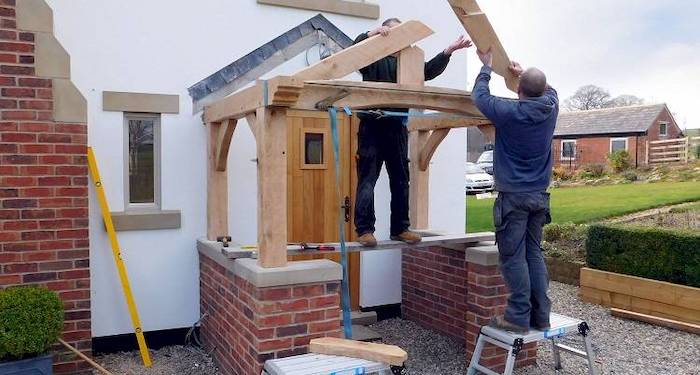
It should only take around 3-4 hours based on the complexity of the porch, but it’s probably not a job you’d want to attempt yourself as it can be quite easy to damage your home in the process.
FAQs
Q: Can you tile a porch roof?
A: You can tile a porch roof, and if your home is tiled, it’s probably the best option. There are a ton of tiling options for your porch, so check them out with fitter when planning your porch.
Q: How big can a porch be without building regulations?
A: You can build a porch at ground level and under 30 square metres and it would normally be exempt from building regulation approval. However for this to happen you must ensure the front door entrance between the existing doorway and the new porch has to remain in place and if you have ramped access to the house the porch must not adversely affect this.
Q: What is the typical size of a porch?
A: Typically, porches are no more than 3 square metres due to planning permission rules, but they can be as small as you need them to be.
Q: How much value will a porch add to my home?
A: It’s hard to determine specifically how much value a porch can add to your home, as it varies from region to region.
If you attempt to shoehorn a porch into a space that probably doesn’t need one, it won’t add a ton of value, but if it makes sense in the layout of your home, it can make it more attractive to buyers and therefore you can raise the asking price in turn.
Q: What is the best style of porch?
A: It all depends on the layout and style of your home, but the numbers don’t lie, and uPVC porches have been significantly more popular than other styles of the past few years.

